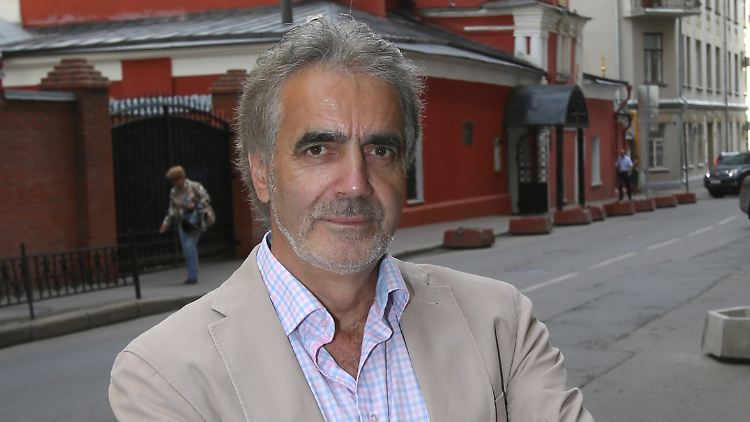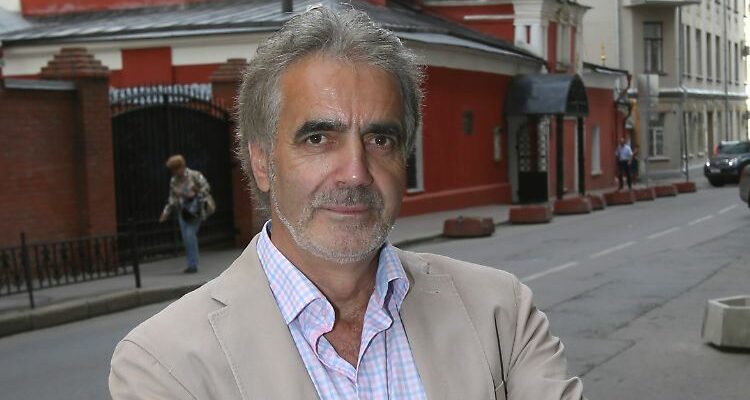In 1945 the Allies liberated Germany from National Socialism. But at the same time, in the east of the soon-to-be-divided country, the Soviet secret service began to establish a regime of terror to which thousands of people fell victim. The secret service employees had brutality in their genes, as author Christian Neef says in an interview. In his book “The Shadow Regime” The long-time Russia correspondent traces their actions and describes how the secret service itself booted out the military administration and how its methods continue to have an impact today. Neef also talks to ntv.de about how the secret service shaped the current Kremlin chief. Putin always relied on the secret service.
ntv.de: Your book is about the actions of the Soviet secret service NKVD in the Soviet Occupation Zone (SBZ) in eastern Germany after 1945. How did you come across the files and cases that you write about?
NKVD is the abbreviation for the Soviet People’s Commissariat for Internal Affairs, which from 1946 was called the Ministry of the Interior. State security was also subordinate to him, which is why both terms are used interchangeably. In 1954 the KGB founded as an independent secret service.
Christian Neef: The starting point was the memories of the former NKVD representative Ivan Serov, which were found in Russia a few years ago. They were walled up in his garage, where he apparently hid them in case he himself was ever followed by the secret service. This book also concerns his years as intelligence chief in the Soviet Zone. A lot of what he wrote was unknown in Germany and I tried to check this using files, especially in Russian archives, but also in Germany. And in fact, much of what he describes corresponds to reality.
What kind of man was Serov, who later became the first KGB chief,?
He was a henchman of Stalin. If you read his diary, you realize that he had no political ambitions but did everything that Stalin instructed. He was very efficient and particularly ruthless, even for secret service people. He also had no scruples. He writes several times that he does not understand decisions from Moscow, but that the political leadership has already thought of the right thing.

Christian Neef is an expert on Russia, Eastern Europe and Afghanistan. From 1983 to 1996 and from 2014 to 2017 he worked for GDR radio and “Spiegel” as a correspondent in Moscow. Today he is a freelance author (including “The Trumpeter of Saint Petersburg”).
(Photo: Yevgeny Kondakov)
Like the British and Americans, the Soviets were also concerned with the denazification of Germany after the war. What was the difference in the approach?
Denazification was of course an important goal that the Soviets pursued more or less honestly. But you can tell that they had very soft criteria. They were often unable to assess who was really a Nazi or war criminal, which is why they arrested people very randomly, even on the lowest possible grounds of suspicion. During the waves of arrests in 1945 and 1946, thousands of people were arrested in one day in the hope that Nazis would be found among them. This affected old people, including children and pregnant women. As in the Soviet Union in the 1930s, the secret service exceeded the plan.
Were other political goals also pursued?
Later, in 1947 and 1948, the task of suppressing any potential political resistance to the occupation and the emerging rule of the SED was added. There, too, people were arrested who were suspected of being a political opposition: young people were accused of membership in National Socialist werewolf organizations, and members of bourgeois block parties were arrested as a preventive measure. The secret service booted out the actual Soviet military government and pursued its own policies.
Was this terror planned from the start?
This brutality was part of the secret service. The employees had this in their genes and brought it with them to the occupied zone. They often distinguished themselves in the 1930s in the persecution of so-called enemies of the people in the Soviet Union. They acted with ruthlessness and brutality, with denunciation, slander and fabricated criminal cases. All of this can also be read in the documents after 1945.
Walter Ulbricht experienced the great terror in Moscow in the 1930s. How did he react when the secret service did the same thing in the Soviet Zone?
Ulbricht knew everything that happened in the 1930s. After 1945 you can see that he was always the one who put the brakes on when others in the SED party executive discussed the random arrests. Many SED basic organizations reported this to the party executive committee in writing or orally because children of functionaries or anti-fascists who had been in concentration camps were also affected. While Wilhelm Pieck tried very carefully to raise this with Stalin in 1948, Ulbricht was always against condemning the Soviets.
Was there a reappraisal of this period after 1990?
In Germany there has been a relatively large amount of research into the post-war period. There was also collaboration with Russian historians when the archives were briefly open. But that quickly stopped when many documents were classified as secret again.
And in Russia?
A Soviet officer, a captain who served in Thuringia, wrote bluntly in a book after 1990 that the organs of the NKVD, the secret service in occupied Germany, were a particularly blatant embodiment of Stalin’s totalitarian regime. They acted independently of the military government and abused its power. Otherwise, there was never any reappraisal in Russia, because two pillars of the system remained untouched after the end of the Soviet Union: the army and the secret service. A reform of the KGB failed, and in the second half of the 1990s the secret service strengthened again and became the FSB. When Putin came to power, he relied on this apparatus.
Is Putin today a secret service agent in the presidential office or a politician with a secret service past?
I would say: the former. He never shed his intelligence background. Even as a teenager in the 1960s and 1970s, he really wanted to join the secret service. At the KGB they even stopped him and said: Study first. After that, he quickly joined the secret service and this clearly left its mark on him. After 1990 he made a career, first in St. Petersburg, then in Moscow in the Kremlin administration. He ended up at the FSB and when he became head of government in 1999, it was clear from many decisions that he always relied on the secret service.
What was his goal?
From the beginning, Putin has worked with the help of the secret service to restore Russia to the strength it once had. He once again opened the front in the Caucasus, triggered the terrible second Chechen war and brutally crushed the insurgents. He found a pretext for this when Chechens allegedly blew up several high-rise buildings near Moscow and in southern Russia. It is now known with almost certainty that Russian intelligence initiated these actions. This will continue in the next few years. When Putin became prime minister in 2008, there were 22 intelligence officers in his government.
And today?
Many governors, many presidential representatives in the regions, many high-ranking officials come from the secret service. For example, Alexei Dyumin, the governor of the Tula region, who is also considered a possible successor to Putin. He was Putin’s personal aide, then deputy head of the security service and colonel general. Putin takes such people up the career ladder and uses them as pillars of his rule or parks them in various positions from where he can then call them up. Nikolai Patrushev, one of Putin’s closest confidants who became FSB chief after him, said in 2000 that the secret services were the new nobility of Russian society. This quote says it all.
What role did the secret service play in the attack on Ukraine?
The FSB played an important role in the preparation of the invasion. Russian sources say that the FSB provided Putin with information that the invasion and advance on Kiev could take place without major difficulties and that Ukraine was in such a disastrous state that it would collapse very quickly. As we now know, that was a total misjudgment. The FSB continued to play a major role afterwards, for example in the deportations of children from the occupied territories.
In your book you write that there are parallels between the actions in the Soviet Zone and the GDR as well as the occupied territories of Ukraine. What do you mean?
For example, from what we hear, the Russians came to Ukraine with ready-made lists to arrest people they considered enemies of Russia. This is exactly what already happened in the Soviet-occupied zone. There were also deportations back then, although not to the same extent as in Ukraine. So there are a lot of parallels there.
Is Putin actually aiming for a resurrection of the Soviet Union and will Russia attack other countries after Ukraine?
We are misled by his quote that the fall of the Soviet Union was the greatest geopolitical catastrophe of the 20th century. He doesn’t want to resurrect the Soviet Union, but rather a strong Russia as it existed before 1914, i.e. the Russian Empire. These include zones of influence that Russia previously had, colonial conquests such as Crimea, Central Asia and the Caucasus. The main thesis is: We have a vast territory that we can only defend if we expand the borders to make our heartland safer.
Despite the terror of the Soviet secret service in East Germany, many people there are now more understanding of Putin and the Russian actions in Ukraine. How do you explain that?
For me, one of the biggest phenomena is that many people no longer want to remember what they or relatives experienced during the Soviet occupation. I myself grew up in a small town that was occupied by the Red Army and remained there until the early 90s. I can remember exactly what my mother kept saying. The relationship with the occupying power was anything but good. There were deaths, there was violence against opposition members, all of this shaped people and their opinions about the occupation. In this respect, I am surprised at the leniency that is often shown towards Putin or his system today, especially in East Germany.
What could be the cause?
I believe that this expresses something completely different: it is an alienation from the Western-influenced majority culture. The supposedly rediscovered closeness to Russia is, I believe, a protective claim. It masks a widespread feeling of opposition to their own government and West German sovereignty of opinion. It is a narrowing of perception that has to do with today, but not specifically with Russia. Furthermore, I doubt that the East Germans know the Russians much better than the West Germans. Despite the presence of the occupying power after 1945, they had relatively little to do with it.
Markus Lippold spoke to Christian Neef
